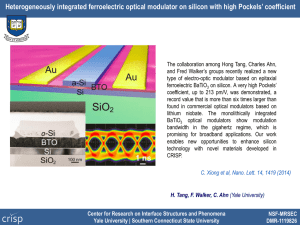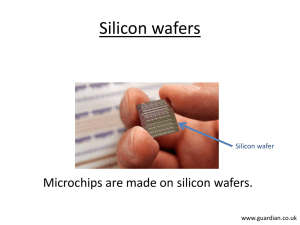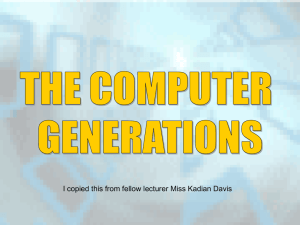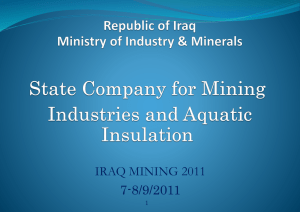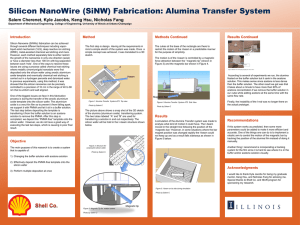Investor_Presentation_November_2011
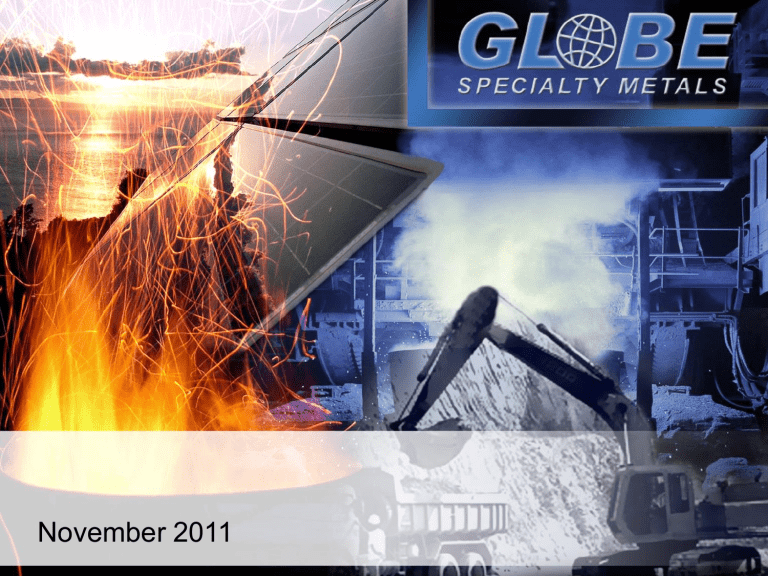
November 2011
Disclaimer
This presentation may contain statements that relate to future events and expectations and, as such, constitute "forward-looking statements" within the meaning of the federal securities laws. These statements can be identified by the use of words such as “believes,” “expects,” “may,” “will,” “intends,”
“plans,” “estimates” or “anticipates,” or other comparable terminology, or by discussions of strategy, plans or intentions. These statements are based on management’s current expectations and assumptions about the industries in which Globe operates. Globe disclaims any intention or obligation to update publicly any forward-looking statements, whether in response to new information, future events or otherwise, except as required by applicable law. Forward-looking statements are not guarantees of future performance and are subject to significant risks and uncertainties that may cause actual results or achievements to be materially different from the future results or achievements expressed or implied by the forward-looking statements. These risks and uncertainties include, but are not limited to, those risks and uncertainties described in Globe’s most recent Annual Report on Form 10-K, including under “Special Note
Regarding ForwardLooking Statements” and “Risk Factors” and Globe’s quarterly reports on Form 10-Q.
These reports can be accessed through the “Investors” section of Globe’s website at www.glbsm.com
.
All references to “MT” or “tons” mean metric tons, each of which equals 2,204.6 pounds.
1
Presenting Management Team
Jeff Bradley, Chief Executive Officer
Over 27 years experience in the metals industry
Joined GSM in 2008
Prior roles include: CEO – Claymont Steel (former public company); Vice President and General Manager – Worthington Industries
Malcolm Appelbaum, Chief Financial Officer
Joined GSM in 2008
President of AppleTree Advisors, Inc. from 2000 until September 2008 – worked with various HIG Capital companies
Prior roles include: Interim-Chief Financial Officer for several underperforming companies; Principal – Wand Partners; Financial Analyst –
Goldman Sachs; and, Senior Consultant at Deloitte
2
GSM: The Leader in Silicon
One of the world’s largest and lowest cost silicon metal producers
− One of the lowest cost producers in the world
− Estimated ~62% and ~11% share of capacity in US and the world, respectively (1)
− Estimated 100% and ~15% share of “merchant” capacity in US and the world, respectively (1)
− Silicon is a critical input in a number of industrial materials and has no substitute
Leading global silicon-based alloy producer
− Sole source relationships with many customers
− 50%+ share of capacity in certain key alloys
− One of two U.S. producers of FeSi and ~50% of U.S. FeSi capacity
− Important provider of silicon-based alloys to steel producers and foundries
Global reach with 9 facilities in 4 countries – U.S., Argentina, Poland and China
− Significant raw materials ownership / proximity
Strong profitability through the cycle with substantial leverage to price
Current economic environment improves this position
Excludes 49% of Alloy, WV facility owned by Dow Corning (1)
3
Global Production
Beverly, OH (CRU #3)
Silicon metal / 13,000 tons
Silicon-based alloys / 52,000 tons
Niagara Falls, NY (CRU #5)
Silicon metal / 27,000 tons
Iceland (Expected 2013)
Silicon metal / 40,000 tons
Shizuishan, Ningxia Hui,
China (“Yonvey”)
Carbon electrodes / 10,000 tons
Alloy, WV (CRU #2)
Silicon metal / 68,000 tons - JV
Globe 51% or 34,700 tons
Dow Corning 49% or 33,300 tons
Selma, AL (CRU #4)
Silicon metal / 25,000 tons
Mendoza, Argentina
Silicon-based alloys / 26,000 tons
New York, NY
Headquarters
Police, Poland
Cored wire / 8 million meters
Bridgeport, AL
Silicon-based alloys / 42,000 tons
Alden Resources*
Specialty Grade Coal &
Preparation plant (2.5 million tons)
San Luis, Argentina
Cored wire / 24 million meters
Product
Silicon metal
Silicon alloys
Cored wire
UMG
Electrodes
Coal & prep plant
Source: Company information, CRU, 2011.
Note: Parenthetical figures reflect CRU, 2011 cost curve rankings.
* Alden Resources acquired on July 28, 2011
4
Track Record of Growth Through Strategic,
Accretive Acquisitions
December 2002
Alan Kestenbaum purchases the debt of
Globe Metallurgical
(“GMI”)
December 2005 January 2007
GMI purchases largest silicon metal plant in the world (Alloy, West
Virginia) from Elkem
GMI raises capital
GSM acquires
Camargo Correa
Metais S.A., a major Brazilian silicon metal producer, renames
Globe Metais
August 2009
Completed successful
IPO on
NASDAQ
Today
April 2010
Completed acquisition of
Core Metals
Group - $52M
One of the largest silicon metal & silicon-based alloys producers in the
Americas
One of the lowest cost silicon metal producer in the world
2002 2004 2005 2006 2007 2008 2009 2010 2011 Today
1874
Predecessor company founded in
1874 in Ohio
June 2004
November 2006 January 2008 November 2009
Alan Kestenbaum obtains control of GMI and leads a reorganization
GMI merges into IME and is renamed Globe
Specialty Metals, Inc.
(“GSM”)
Acquires 81% of Solsil,
Inc., a producer of upgraded metallurgical grade (“UMG”) silicon, from a related party
GSM acquires Stein
Ferroaleaciones S.A., an Argentine specialty silicon alloys producer, renames Globe
Metales
May 2008
Acquires 70% of a
Chinese carbon electrode manufacturer
(“Yonvey”)
Completed sale of Brazil plant -
$75M
JV with Dow
Corning – Alloy,
WV - $100M
February 2011
Entered agreements to build world class, low cost silicon plant in Iceland
July 2011
Completed acquisition of
Alden Resources
5
Well-Diversified Business Mix
Current Capacity Mix
Magnesium
Ferrosilicon (MgFeSi),
23%
Ferrosilicon (FeSi),
27%
End-markets
Other
12%
Steel
19%
Silicon (Si), 43%
Revenue by region
Europe
13%
South America
3%
Asia/Other
3%
Calcium Silicon (CaSi),
7%
Foundry Alloys
22%
Customers
Other
58%
North America
81%
Note: All data exclude the 49% of the joint venture owned by Dow Corning
Aluminum
20%
Chemicals &
Polysilicon
27%
7%
7%
7%
4%
4%
5%
2%
2%
2%
2%
6
Western World’s Lowest Cost Silicon Metal
Producer
2011 Western World Silicon Metal Cost Curve
$2,500
$2,300
$2,100
$1,900
$1,700
$1,563
$1,597 $1,601
$1,613
$1,675
$1,500
$1,832
$1,848
$1,867 $1,873 $1,876 $1,879
$1,896
$1,917 $1,919
$1,954
$1,992
$2,029 $2,030
$2,057
$2,171
$2,187
$2,209
$2,337 $2,346
$1,300
A Alloy, Beverly,
WV
(1)
OH AL Falls,
NY
B C D E F G H I J K L M N Breu
Branco,
Brazil
(1)
O P Q R S
Source: CRU, 2011.
Note: Red line denotes median operating cost per ton.
Argentina and Bridgeport facilities not currently researched by CRU.
Costs are Ex-works and exclude depreciation expense
(1) Breu Branco, Brazil was sold to Dow Corning Corporation in November, 2009; 49% of Alloy, WV capacity sold to Dow Corning Corporation
7
Strong Barriers to Entry with Consolidated
Supply Base
Strong Barriers to Entry
Power (36%) – requires stable, long-term supply of low cost electricity
Raw materials (40%)
− Proximity to high purity, low cost raw materials – GSM owns quartz and wood chips supply
− Freight costs are significant – 6.6:1 ratio of inputs to output
Consolidated Supply Base
Western World Silicon Metal “Merchant” Production
Elkem/Blue
Star
15%
Globe
Specialty
Metals
15%
6.6 tons of raw materials
1 ton of silicon metal
Low ash, specialty coal – best carbon source
Electrodes – quality is critical – GSM owns supply - China
Capital cost of greenfield construction
− $180 million for a two-furnace operation
− GSM has 17 furnaces
Long lead time to build greenfield plant
−
−
Permitting is a long and complicated process
3
–5 years from concept to commissioning
Silicon metal primarily produced in:
− North America, South Africa, Brazil, Western Europe,
Australia, China
Technology and operational capability
Other
40%
AMG
7%
FerroAtlantica
23%
Top 4 producers = 60%
Pro Forma for Iceland, GSM market share will increase to 19%
Source: CRU, 2011. Globe supply excludes 49% of the Alloy, WV facility owned by Dow Corning.
Merchant supply excludes Dow Corning and Wacker captive capacity of 207,000 and 55,000 metric tons, respectively.
Raw materials are emerging as the most significant barrier to entry
8
Prices Resilient /
Substantial Leverage to Price
Strong demand continues to drive silicon metal prices
Silicon Metal Price Movement ($/lb.)
$2.00
GSM has Substantial Leverage to Price
Costs are stable and facilities are some of the most efficient in the world
$1.80
$1.60
$1.40
$1.20
$1.58
Control of inputs through ownership or longterm contracts
$1.00
$0.80
$0.60
Each 1¢/lb ($22/mt) increase in silicon & silicon based alloy price leads to ~$4.6 million more in
EBITDA at full capacity
Silicon metal ($/lb.)
Source: Metal Bulletin. Note: EBITDA impact estimated based on assumed $0.01/lb increase on all 90,000 and 120,000 tons of silicon metal and silicon-based alloys capacity, respectively.
9
End Markets
Chemicals
(50% of market)
Aluminum
(40% of market)
Solar /
Electrical
(10% of market)
Silicones Coatings
Oils
Cosmetics
Hydraulics
Textiles
Polishes
Mechanical fluids
Resins
Insulators
Waterproofing
Paints
Rubber
Automotive
Insulators
Consumer items
Coatings
Adhesives
Sealants
Rubber
Thermoplastics
Fiberglass
750,000 tons consumed by chemical industry
GDP + 4% growth
Auto /
Commercial
Auto / commercial vehicles
Engine parts
Wheels
Transmission
Other
Other
Marine
Railway
Machinery & equipment
Electrical
600,000 tons consumed by aluminum industry
Aluminum content in autos has increased over the past 20 years
Note: % of sales figures represent industry estimates of western world consumption
Solar Electronics
Photovoltaic cells for solar energy systems providing clean power to homes, buildings and industry
Semiconductors for integrated circuits
(chips) for:
Mobile telephones
DVD recorders
Computers
Calculators
Video games
Televisions
Radios
Auto electronics
Medical electronics
Communications
Weapons
Driven by increasing demand from the growing middle-class of BRIC countries and from global demand for renewable energy
10
Aluminum Production Trending Higher
Silicon metal is required in aluminum as a strengthener and alloying agent to improve castability and minimize shrinking and cracking
Aluminum provides a lighter weight alternative to steel
Aluminum demand has increased at a 5%+ CAGR for the past 20 years
Global primary aluminum demand
(000s tons)
50,000
45,000
40,000
35,000
30,000
25,000
20,000
15,000
10,000
5,000
0
2003 2004 2005 2006 2007 2008 2009E 2010E 2011E 2012E 2013E
North American light vehicle aluminum content as a percent of curb weight
12.0%
10.4%
9.6%
10.0%
8.8%
7.8%
8.0%
7.1%
6.4%
6.9%
326 pounds
6.0%
4.5%
77 pounds
3.9%
4.0%
2.0% 2.1%
2.0%
Approx. 10kg of silicon metal per car
0.0%
1970 1975 1980 1985 1990 1995 2000 2005 2010E 2015E 2020E
Source: Bloomberg, Brook Hunt and Street research.
Source: Ducker Worldwide.
Note: Based on 3,600 lbs of curb weight.
11
Solar Demand is New Large-Scale
Opportunity
Rapidly growing demand for polysilicon due to solar industry growth
−
−
Increased electricity consumption
Demand for alternative energy sources
− Availability of government financing programs
1.4 tons of metallurgical grade silicon required for every 1 ton of polysilicon
22,000
20,000
18,000
16,000
14,000
12,000
10,000
8,000
6,000
4,000
2,000
0
2008 2009 2010
Total Solar Poly Demand (tons)
Source: EPIA May 2011 and management estimates.
2011E 2012E
Total Met. Grade Silicon Demand (tons)
2013E
300,000
250,000
200,000
150,000
100,000
50,000
0
2014E
Total Solar PV Demand (MW)
12
Polysilicon Capacity & Pricing
Demand from the solar industry is driving an expansion of polysilicon production capacity
Polysilicon pricing has dropped from a peak of $415/kg in mid 2008 to a current range of $30-40/kg
Approximately 12,000 tons of silicon are required to produce 1GW of solar power.
EPIA estimates that approximately 15GW of solar power will be installed in 2012
350,000
300,000
250,000
200,000
150,000
100,000
50,000
0
2008 2009 2010
Additional Polysilicon Capacity
2011E 2012E 2013E
Total Polysilicon Capacity
2014E
Note: Total & Additional Polysilicon capacity excludes China
Source: Credit Suisse, CRU, Photon Consulting and management estimates.
13
Silicon Alloys Are Key Ingredients in Steel and Foundry Products
Steel Foundry
Ferrosilicon
(FeSi)
1 of 2 U.S. producers
~50% U.S. capacity and
~40% North American capacity
Calcium Silicon
(CaSi)
Only 6 producers in
Western World
~18% global market share and ~50% U.S. share
Commodity Specialty
Used in production of carbon steels, stainless steels and other steel alloys
High grade specifications
Requires technical knowhow
Competitive advantage in providing technical advice and service by tailoring composition to customers’ requirements
Magnesium Ferrosilicon
(MgFeSi)
Ductile Iron Pipe
Used in applications where strength and formability are required
− Automotive components
Often sole supplier
Short lead times and variety of grades discourage imports
Water transmission
~50% share of the magnesium ferrosilicon market in the
Americas and 20% in the Western World
14
Supply / Demand Imbalance
Limited new supply
Little additional capacity is expected beyond GSM’s Iceland plant
Chinese government has been closing plants that are energy inefficient or do not comply with environmental standards
Barriers to entry are high
Global demand continues to increase
Two new polysilicon plants will come online in the US, one in 2012 and another in
2013 with demand of 40,000MT of silicon metal
Growth in silicones market driven by an expanding middle class in developing nations and novel applications of silicones across all industries
15
Iceland Plant Overview
Approximate 85% ownership interest, with 15% minority partner.
Capacity of approximately 40,000 MT of silicon metal annually.
Two 30 MW furnaces.
18 year long-term, competitively priced power agreement.
Total construction cost of approximately €115 million.
Financing of €79 million.
Expected to be operational in calendar 2014.
Local tax incentives, including low corporate tax rate, employee training credits and accelerated depreciation.
Significant projected returns including accretive impact to earnings, substantial cash-on-cash IRR and significant annual returns on cash investment.
16
Alden Resources Acquisition
Acquisition overview:
The leading North American supplier of specialty metallurgical coal to the silicon and silicon-based alloy industries with approximately 21 million tons of reserves and 15 million tons of inferred resources
Allows Globe to secure a stable, long-term and low-cost supply of this key raw material to support its continued growth worldwide
Owns and operates a newly upgrade coal preparation plant in eastern Kentucky that is capable of processing over 2.5 million tons of coal per year.
Also supplies all North American and some international silicon and silcon-based alloy producers
Globe is funding growth capex to expand and improve output
17
Alden Coal Advantage
Carbon sources:
1.
Central Appalachian Coal
– Alden
2.
3.
Colombian Coal (needs to be separated, washed in Europe and then shipped)
Charcoal
Charcoal prices are now over $550/MT
Charcoal shortages is China
Tighter restrictions on Brazilian charcoal
Columbian coal is a mixture requiring segregation and significant transport expense through Europe
Markets:
− Low ash coal
– key raw material in production of silicon metal and specialty ferrosilicon
− Medium ash coal
− Ferrosilicon – commodity grade
− Pulverized coal injections (PCI)
– 1 ton of PCI displaces 1.4 tons of coking coal
− Water purification
– carbon filters
− Thermal coal
– high BTU/ low sulfur 18
Financial Highlights
Production and input costs uncorrelated to silicon metal prices – yields substantial leverage to price
Highly variable cost structure and low overhead – raw materials and power accounts for 75% of production costs
Control over inputs – lease and operate quartz mines and entered multi-year power contracts
Conservative capital structure with flexibility to pursue growth opportunities
Declared $0.20 annual dividend payable in October 2011
As of September 30, 2011: Cash balance of $152 million, total debt of $106 million, availability under credit facilities of $48 million
19
Strong Financial Results Through
Challenging Times
Revenue
($ in millions)
$800
$600
$400
$200
$0
$222
2007
$453
2008
$426
2009
$473
2010
$642
2011
$699
LQA
Adjusted EBITDA (1)
($ in millions)
$200
$160
$120
$80
$40
$0
$30
$78
2007 2008
$73
2009
$71
2010
$128
2011
$170
LQA
Capital expenditures
($ in millions)
$60
$50
$40
$30
$20
$10
$0
$9
$22
2007
$51
2008
Growth
2009
Maintenance
$23
2010
$35
2011
Adjusted EPS (2)
($ per share)
$1.50
$1.25
$1.00
$0.75
$0.50
$0.25
$0.00
$0.24
2007
$0.50
2008
$0.49
2009
$0.42
2010
$0.81
2011
$1.12
LQA
Note: Historical data is not pro forma for the Dow Corning transactions.
(1) Adjusted EBITDA for fiscal 2009 is EBITDA plus goodwill and asset impairment charges of $69.7 million, deferred offering costs of $2.5 million, restructuring costs of $1.7 million, prior period power penalty of
$1.0 million and inventory write-downs of $5.8 million. Adjusted EBITDA for fiscal 2010 is EBITDA plus, prior period power adjustment of ($0.5) million, fixed asset impairment of $0.7 million, transaction expenses of $0.7 million and start-up costs of $10.0 million, less a gain on the sale of Globe Metais of $19.7 million. Adjusted EBITDA for fiscal 2011 is EBITDA plus, transaction expenses of $5.0 million,
(2) start-up costs of $3.2 million, and gain on the sale of business of $4.2 million, less net settlements of $5.1 million. Adjusted EBITDA for LQA (the quarter ended Sept 30, 2011) is EBITDA plus transaction expenses of $1.7 million and gain on the sale of business of $(0.4) million annualized.
Fiscal 2009 EPS adjusted for goodwill and asset impairment charges of $69.7 million, deferred offering costs of $2.5 million, restructuring costs of $1.7 million, prior period power penalty of $1.0 million and inventory write-downs of $5.8 million. Fiscal 2010 EPS adjusted for prior period power adjustment of ($0.5) million, fixed asset impairment of $0.7 million, transaction expenses of $0.7 million and start-up costs of $10.0 million, less a gain on the sale of Globe Metais of $19.7 million. EPS for fiscal 2011 is adjusted for, transaction expenses of $5.0 million, start-up costs of $3.2 million, and gain on the sale of business of $4.2 million, less net settlements of $5.1 million. EPS for LQA (the quarter ended Sept 30, 2011) is adjusted for transaction expenses of $1.7 million and gain on the sale of business of $(0.4) million annualized, annualized.
20
Conservative Capital Structure Positions the
Company for Growth
($ in millions)
Cash and Cash Equivalents
$90mm GMI Revolving Credit Facility (L + 150 bps)
Alden Resources Financing
WVM Working Capital Facility
Other Debt
Total Debt
Noncontrolling Interest (9/30/11)
Total Stockholders' Equity (9/30/11)
Total Capitalization
Cash per Fully Diluted Share
Total Debt / LTM Adjusted EBITDA
Net Debt / LTM Adjusted EBITDA
Debt / Capitalization
Market Statistics:
Market Capitalization (11/11/2011)
Enterprise Value
09/30/11
$152.3
$40.0
50.0
15.0
1.1
$106.1
38.5
$552.4
$658.5
$1.98
0.7x
(0.3x)
16.1%
$1,145.0
1,137.2
Note: LTM adjusted EBITDA of $153.4 million.
Share information
75,035,177 basic shares outstanding
4,314,249 options outstanding
21
Summary Highlights
Leading global market share in silicon metal
One of the world’s lowest cost producer
High barriers to entry in an already consolidated industry
Large cash position and unlevered balance sheet – poised for accretive acquisitions
Improving trends in key end-markets and new growth markets
Substantial leverage to price
Experienced and cost conscious management team with unique operational skills and proven history of growth by acquisition
Globe Specialty Metals is a business with strong fundamentals that presents a unique opportunity for accretive growth
22
Appendix
Strong and Experienced Management Team
Alan Kestenbaum
Executive Chairman
Founder / >20 years in industry
Jeff Bradley
Chief Executive Officer
2008 / >25 years in industry
Malcolm Appelbaum
Chief Financial Officer
2008 / >25 years of experience
Stephen Lebowitz
Chief Legal Officer
2008 / 19 years of experience
24
Board of Directors
GSM’s Board of Directors is comprised of seasoned executives with strong management, metals, finance and international experience
Alan Kestenbaum (Executive Chairman)
Stuart Eizenstat
− Partner, Covington & Burling LLP; Former Deputy Secretary of the United States Department of the Treasury; International Advisory Board Member of Coca-Cola, Board Member of UPS
Franklin Lavin
− Chairman of the Public Affairs practice for Asia-Pacific at Edelman; Former Managing Director and
Chief Operating Officer of Cushman & Wakefield Investors Asia; Former Under Secretary for
International Trade at the United States Department of Commerce
Thomas Danjczek
− President of the Steel Manufacturers Association; former senior executive at Wheeling-Pittsburgh
Steel Corporation
Donald Barger, Jr.
− Former Chief Financial Officer at YRC Worldwide, Worthington Industries and Hillenbrand
Industries; Board Member and Audit Chair of Gardner Denver and Quanex
25
EBITDA Reconciliation
($ in millions)
Net income (loss)
Provision for income taxes
Net interest expense
Depreciation and amortization
EBITDA
(1)
Goodwill and intangible asset impairment
Deferred offering costs
Transcation expenses
Restructuring costs
Gain on sale of business
Power adjustment
Selma & Niagara start-up expenses
Settlements, net
Inventory write-downs & fixed asset impairment
Adjusted EBITDA
(1)
2007
$11.8
7.0
0.1
10.6
$29.7
–
–
–
–
–
–
–
–
–
$29.7
2008
$35.7
15.9
7.0
19.3
$78.0
–
–
–
–
–
–
–
–
–
$78.0
Fiscal year ended June 30,
2009 2010
($45.4)
11.6
6.2
19.8
($7.8)
69.7
2.5
–
1.7
–
1.0
–
–
5.7
$73.0
$34.3
20.5
4.1
20.7
$79.5
–
–
0.7
(0.1)
(19.7)
(0.5)
10.0
–
0.7
$70.6
2011
$56.7
36.0
3.0
25.1
$120.8
–
–
5.0
–
4.2
–
3.2
(5.1)
–
$128.1
LQA
$84.3
46.0
5.5
29.2
$165.0
–
–
6.7
–
(1.9)
–
–
–
–
$169.8
(1) EBITDA and Adjusted EBITDA include non-cash share-based compensation expense of $5.1 million, $5.7 million, $6.4 million, $8.2 million and $0.5 million for the latest twelve months ended March
31, 2011, and the fiscal years ended June 30, 2010, June 30, 2009, June 30, 2008, and June 30, 2007, respectively.
Note: LQA represents the last quarter ended September 30, 2011, annualized
26
